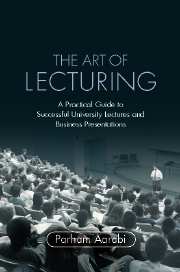Book contents
- Frontmatter
- Contents
- Preface
- 1 Introduction
- 2 The lecturing mindset
- 3 Old school basics
- 4 General lecturing principles
- 5 At the beginning of the lecture
- 6 Things you should be aware of during the lecture
- 7 Effective tools/tricks to energize your lecture
- 8 Common mistakes that turn good lectures into disasters
- 9 At the end of the lecture
- 10 The art of academic lecturing
- 11 Making lectures come to life through labs
- 12 Lecturing in non-academic contexts
- 13 The mechanics of professional presentations
- 14 Final words
- About the Author
- Index
2 - The lecturing mindset
Published online by Cambridge University Press: 31 January 2011
- Frontmatter
- Contents
- Preface
- 1 Introduction
- 2 The lecturing mindset
- 3 Old school basics
- 4 General lecturing principles
- 5 At the beginning of the lecture
- 6 Things you should be aware of during the lecture
- 7 Effective tools/tricks to energize your lecture
- 8 Common mistakes that turn good lectures into disasters
- 9 At the end of the lecture
- 10 The art of academic lecturing
- 11 Making lectures come to life through labs
- 12 Lecturing in non-academic contexts
- 13 The mechanics of professional presentations
- 14 Final words
- About the Author
- Index
Summary
The mindset of an individual is perhaps the most important attribute in determining that person's success. People with positive, optimistic, and ambitious mindsets tend to achieve more than those who are negative, overly pessimistic, or lack any kind of ambition. Perhaps the most important reason to have the right mindset is to overcome and defeat fear and failure, which can only be done by optimism and a positive, resilient, and determined attitude.
Having the right mindset is even more important for certain careers where quick reflexes and constant adaptability are required. And, just like anything else in life, the right mindset for any task can be acquired easily with enough practice and training. In this chapter, we will take a closer look at the mindset required for delivering successful lectures.
Case in point
Prior to the start of my lectures, I use a few minutes to walk through the audience while engaging in short but interesting discussions with them. The conversations generally consist of short greetings and questions about their daily activities. This action, aside from improving my relations with the audience, has a very positive effect on my mindset. First, it allows me to get more familiar with the students, thereby allowing me to use this familiarity to my advantage during the delivery of the lecture. Second, it sets my mindset into a talkative state from which giving a lecture comes quite naturally.
- Type
- Chapter
- Information
- The Art of LecturingA Practical Guide to Successful University Lectures and Business Presentations, pp. 15 - 22Publisher: Cambridge University PressPrint publication year: 2007



